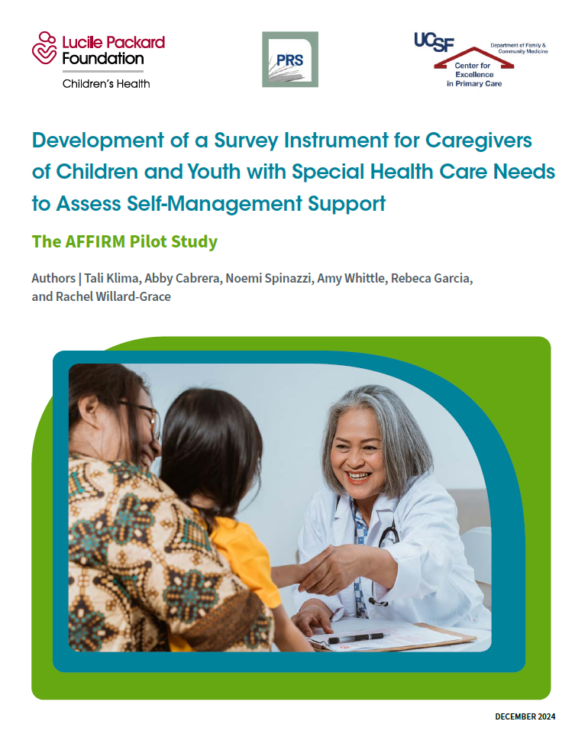The Mental Health Journey of a Mother and Daughter
When Magaly was 11, her mother, Olga, found suicide plans on her phone. Six years later, they continue to navigate the challenges of Magaly’s diagnosis of depression and psychosis. Their journey touches upon the importance of early identification of mental health issues, access to care, and the struggles for support. Children with chronic and complex physical conditions often have mental and emotional issues that go unrecognized and untreated.
Olga’s Story
Olga is a Family Resource Specialist at Support for Families in San Francisco.
Magaly was 11 years old when she planned to kill herself. I had noticed cuts on her arm for some time but she always told me they were scratches from falling. It wasn’t until the cuts went from a criss-cross to deep straight lines that I knew something was wrong. I looked through her phone and found detailed plans, ranging from which friend would get her belongings to notes saying goodbye to loved ones. She left in the middle of school that day, walking around for hours, looking for a highway to jump off. The earliest doctor’s appointment available was for the following Monday, which was extremely frustrating. I spent that weekend watching Magaly’s every move, but also careful not to alarm or scare her. I didn’t want her to run away.
On that Monday, Magaly was diagnosed with major depression and psychosis. She finally told us about the strong voices inside her head. She said she had been hearing them for as long as she could remember. It was then that I realized why, as a baby, Magaly would cry any time she was left alone. She once turned purple from crying when I left her momentarily to use the restroom. It was the voices that were scaring her.
Sending your child to a behavioral health center is not the same as to a regular hospital. That same day they put Magaly in the ambulance for transport and I was not allowed to ride with her. It was a state policy. Parents are only allowed to see their child during visiting hours, the rest of the time the doctors just call you with updates or requests for medication approval. I remember Magaly calling me from the center, scared and begging to come home. “Mom this is my fault, I’ll try to behave, please, I’ll do anything to come home,” she pleaded. What else could I tell her except to hang in there and that I would come during the next visiting hours.
For Magaly, every day feels like she is carrying a big stone on her back. I know this is why it’s not easy for her to do the simple everyday things like get out of bed, shower, and go to school. She always has this extra weight with her. This is something she will struggle with for the rest of her life.
There is a stigma around mental health that often feels like blame for you and your child. From the policies that dictate when a parent can be with their child during treatment to the way we question parents of children with mental illness, the entire experience can be extremely isolating. What parents need is support. From a peer-to-peer perspective, it is helpful to talk with parents about how to manage the stress. When we meet others who are surviving it gives the rest of us hope. From caregivers, parents need a safe place where their concerns are heard, not criticized. From our health care system, we must demand mental health services for our children. We cannot wait until they are planning suicide to intervene and we must find ways to care for our children beyond being stabilized in a hospital.
Magaly turns 18 in June, and with that comes the usual mother-daughter challenges. You know everything when you’re 18, right? She doesn’t trust me as much. Sometimes she won’t tell me how she’s feeling because she knows I’ll take action. These days I’m trying to step back more and let Magaly learn to ask for help on her own. I know she will be the best advocate for herself and other children just like her.
Magaly’s Story: Living with Depression and Psychosis
Magaly, 17, is from San Francisco. She is a student at Galileo Academy of Science and Technology and a published poet.
The voices in my head are weird. Right now, there are five of them, two boys and three girls. The voices can be like whispers; those are constant. It sounds like a hissing noise, like a window that is open a crack on a windy day. The voices can also be clear, speaking distinct phrases. I’ll see a tree and the voices will say, “You can hang yourself from that tree.” My inner monologue is louder but sometimes the voices can defeat it. When that happens, I have to yell out loud to hear myself.
When I was 11, my mom found my suicide plans on my phone. I had done internet research beforehand and made three options for myself: 1. Take pills, 2. Get run over, 3. Slit wrists. When I was evaluated at the Children’s Crisis Center, they kept asking me how many times I had thought about killing myself, and how many times I had felt depressed. I remember staring at a plastic water bottle and thinking about why they make water bottles, who came up with that idea. I completely disassociated from what was happening; they were sending me to a hospital and I just wanted to ignore everyone. I was diagnosed with major depression, psychosis and post-traumatic stress disorder.
The hospital felt like a prison. Nobody was allowed to wear shoes with laces or hoodies with strings. The walls were painted a light yellow and the windows were covered with curtains held back with Velcro. I felt trapped and terrified. When I called my mom she told me, “We didn’t want to send you there. It probably doesn’t look like a prison.” But she wasn’t there, she didn’t know.
I’m not sure when I started to hear the voices. My mom told me I couldn’t be left alone when I was a baby. I remember having panic attacks and now I realize it’s the voices. When I really think about it, I actually have no memories of not being depressed, it’s always been there. Sometimes when people ask how I’m doing, I want to lie and say I’m fine. If I told people how I really feel, they would send me to a hospital.
Sometimes I consider suicide for the stupidest reasons. The voices will say, “You gotta do this, you gotta do this now.” I’ll feel it for a minute, maybe an hour, sometimes for a whole day. That’s when I use my inner monologue to remind me why I need to live. I think of my sister and how much she needs me. I think of Kasia, my mentor from the Big Sister, Big Brother program. They are rocks. Support from friends, school and home all help. These days I feel depressed but in a different way, it’s not numb like before, I can feel other things at the same time. That’s good because it means I haven’t gone the other way, the point of no return.
Special thanks to Olga and Magaly for sharing their stories.

